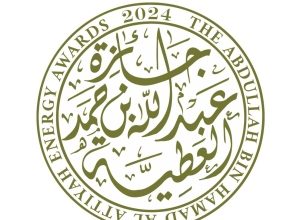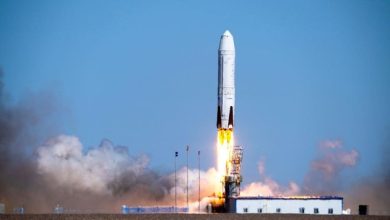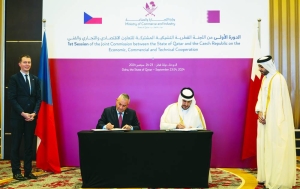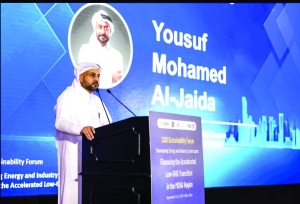IAG CEO wants US style sustainable aviation fuel hub in UK

SAFs, which can be produced from a range of by-products such as used cooking oil and agricultural waste, as well as synthetically from renewable energy, can be used in existing jet engines. These green fuels can reduce lifecycle emissions by about 70%. Currently though, they represent less than 1% of all jet fuel being used.
The demand is there. Aviation has an industry-wide commitment to be net zero by 2050, and many airline groups, including IAG, have additional SAF targets. IAG bought 12% of all available SAF globally in 2023, but production in greater volumes is needed and fast.
Progress is being made across the Atlantic and in continental Europe. The US has a leading position in SAF production, thanks largely to the Inflation Reduction Act. The Biden administration has committed to supporting the production of 9mn tonnes of SAF annually by 2030. Meanwhile, the EU has committed innovation funding worth hundreds of millions of euros aimed at reducing the price gap between conventional jet fuel and SAF.
Earlier this month, the UK confirmed a 10% SAF mandate. This is a welcome step, supporting industry-wide efforts to decarbonise while positioning the UK as a potential leader. But mandates alone are not enough. The UK now needs to build on this by quickly deploying incentives to encourage production. The government recently launched a consultation on the options for a mechanism to give producers revenue certainty. Through our participation in the Jet Zero Council, IAG will seek to recommend a way forward, but a decision is needed quickly.
This combined with the recent SAF mandate would provide a strong signal of support to the market. Airlines are willing to pay for SAF, we just need the supply. So the remaining question is, will that supply continue to come mostly from the US? We would like to use our resources to help scale a UK and European SAF industry, and I believe it can be done”.
International Airlines Group (IAG) have signed several SAF purchase agreements to date, with e-SAF (power-to-liquid) producer Twelve, which will supply advanced e-SAF made from made from CO2, water and renewable energy.
Under the terms of the fourteen-year contract, Twelve will supply IAG with 785,000 tonnes of e-SAF to support its five European airlines, British Airways, Iberia, Aer Lingus, Vueling and LEVEL. IAG say the next- generation fuel will reduce lifecycle greenhouse gas emissions by up to 90% versus conventional jet fuel. It’s the first European airline group to announce an e-SAF deal, and the agreement will enable IAG to continue increasing its SAF use, which was approximately 12% of the world’s supply in 2023.
IAG is one of the world’s largest airline groups with 582 aircraft, directly connecting Europe to 250+ destinations in 91 countries and carrying 115+ million passengers per year. Its airlines include Aer Lingus, British Airways, Iberia, Vueling and LEVEL. The Group also consists of two additional businesses; IAG Cargo and IAG Loyalty. Qatar Airways remains the largest shareholder of IAG, with a 25.2% share. Qatar Airways first purchased a stake in IAG in 2015, building it from 10% to 20% over the space of a year.
The deal brings the scale-up of e-SAF, produced using power-to-liquid technology, one step closer to reaching its full potential in the aviation industry. E-SAF does not face feedstock limitations, has a high degree of emissions reduction versus conventional jet fuel and has a relatively low land and water-use footprint.
SAF is chemically almost identical to kerosene. SAF is certified to international standards to ensure it is safe to use in existing aircraft and airports. The feedstocks for these fuels – currently waste materials such as used cooking oil, municipal waste or waste wood – absorb or avoid greenhouse gases before this carbon is recycled into fuel and then used. E-SAF is the power-to-liquid is a process that converts renewable electricity, water and CO2 into synthetic liquid fuels that can be used in aviation. The CO2 can be captured from various sources, such as industrial emissions, biogenic waste, or direct air capture. The renewable electricity can be generated from solar, wind, hydro, or other sources.
Twelve, based in Berkeley, California, is considered a leader in carbon transformation and power-to-liquid technology. The company has developed and patented a proprietary process that can produce high-quality synthetic fuels from renewable electricity and CO2. The company is constructing a demonstration plant in. The two companies first began partnering in 2020, when Twelve joined IAG’s Hangar 51 start-up accelerator programme to commercialise Twelve’s technology.
IAG describe the new Twelve partnership as “a major step forward” on the journey towards 2030, when IAG has committed as a Group to fly with 10% SAF—the first European airline group to set this target. With the deal, IAG has now secured one-third of the SAF needed to reach its 2030 target.
Luis Gallego, IAG’s CEO said: “We have a roadmap to achieve net zero by 2050 including a target to fly with 10% SAF by 2030. The shortage of sustainable fuel globally continues to be a problem for our industry although innovative companies like Twelve are an important part of the solution.
“This new deal will contribute towards our 2030 SAF target. We would like to see similar projects scale in Europe, and we look forward to working with governments across our key markets to build a SAF industry to deliver jobs, economic growth and a stable supply of SAF.”
Nicholas Flanders, Twelve’s Co-Founder and CEO said: “We are proud to partner with IAG on this historic deal to advance sustainable aviation with our e-SAF that has up to 90% lower emissions than conventional jet fuel. Our power-to-liquid E-Jet® fuel offers industry-leading emissions reduction potential with the added benefits of an abundant feedstock supply and significantly smaller land and water footprints compared to alternative SAF pathways.”
This deal is the largest e-SAF commitment announced by any European airline Group, which earned IAG an award for ‘SAF Offtake Deal of the Year’, at the inaugural SAF Investor Conference and Awards, in London on February 27.
As part of its sustainability roadmap, IAG is also investing in new aircraft and implementing fuel efficiency initiatives, purchasing, and investing in SAF, and advancing carbon removals to mitigate any residual emissions from its operations. In 2021, the Group set a target of using 1mn tonnes of SAF a year by 2030, dependent on appropriate government policy support. IAG say this volume will save as much greenhouse gases as taking one million cars off the road per year.
While other technologies such as electric and hydrogen remain decades away, SAF can be used now. Today, SAF represents less than 0.1% of global jet fuel volumes and fuel standards allow for just a 50% SAF blend in commercial jet engines.







